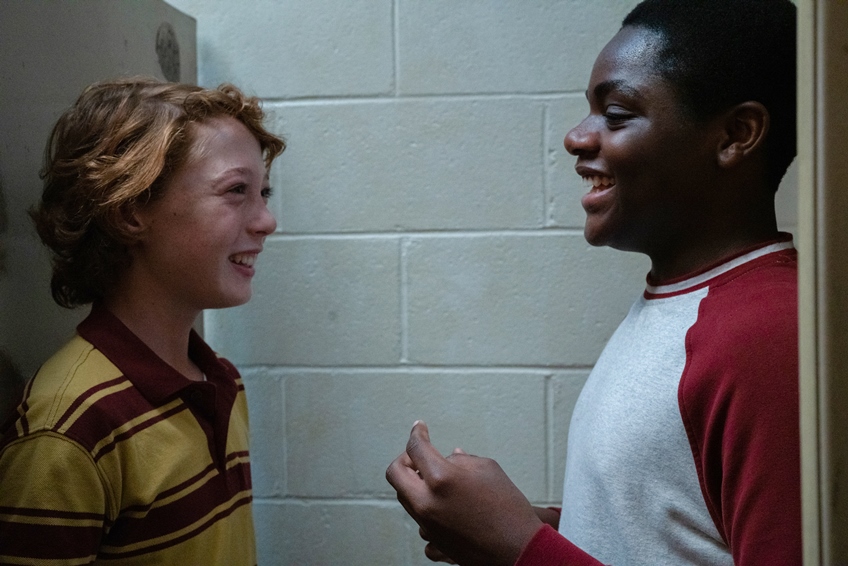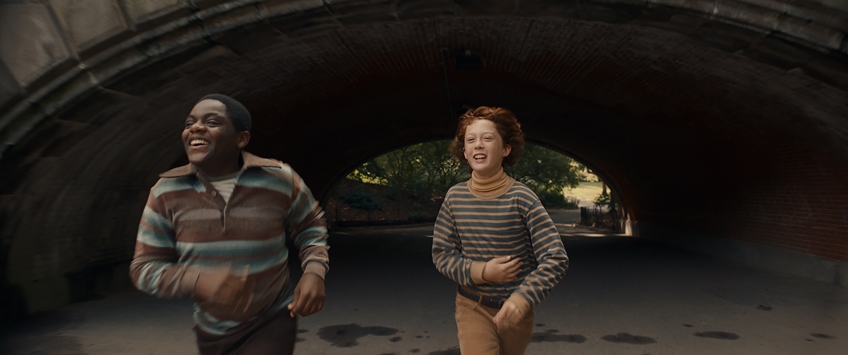Joyce Glasser reviews Armageddon Time (November 18, 2022) Cert 15, 114 mins.
After traipsing through the deadly jungles of Brazil for The Lost City of Z and exploring outer space in Ed Astra, New York born writer-director James Gray turns as close to home as you can get in a beautifully written and acted autobiographical coming-of-age story, rich in period detail. Though the film is specific, it will turn back the clock for many with its universal themes and questions. There is a problem however, in getting so close to home. While the family, friends and teachers of sixth grade protagonist, Paul Graff (Banks Repeta) are vividly rendered, Repeta is saddled with too heavy and ambiguous a role to carry the movie.
A caption identifies the time and place: 1980, public school 183, Queens, New York. It is here, on the first day of the new term, that twelve-year-old Paul sketches Mr Turkeltaub (Andrew Polk) their strict new teacher and shows the drawing to the other students. Furious that he is being undermined, Turkeltaub weeds out the culprit by threatening to punish the whole class. Paul, a mousy, ginger-haired boy with pale skin and blue eyes, squeaks, ‘I just wanted to make people laugh.’ Paul, who seems like a serious kid, more annoying than funny, is far from a future stand-up comedian. He has only one aim: to be ‘a famous artist’
In solidarity with Paul, Johnny Davis (Jaylin Webb, Emmett Till in the upcoming Till) an African-American student who has already stayed back a year, acts out until both boys are excluded from gym. Their rebellious stance unites them, Paul sharing his wish to be an artist, Johnny, caught up in excitement of the Apollo missions, and the possibility of escape, enthralled with the less realistic dream of being an astronaut.
This touching and uncannily credible friendship does neither boy any favours. Paul, however, learns first-hand about the advantage of class, colour, and knowing the right people in getting ahead in life.

When Johnny is worried about getting into trouble, given his past record and home life, Paul reassures him that his mother is head of the PTA. When Paul urges Johnny to go on the class trip to the Guggenheim museum the next day, he mentions that his family is rich and can pay for Johnny’s trip, provided he forge his guardian’s signature. Johnny lives with his dying grandmother and worries about being taken away from her by social services, but he goes along with Paul’s idea.
Here again, we sense that Paul is too young to understand power and money, exaggerating both his middle class mother, Esther’s (Anne Hathaway, Les Misérables) ability to get Johnny out of trouble, and his working class plumber-turned-engineer father Irving’s (Jeremy Strong, Molly’s Game) bank account. A sensitive boy who has learnt from his Liberal family to help those less fortunate, Paul has not learnt not to steal, and takes his mother’s cash to fund Johnny’s school trip.
At the Guggenheim, Paul is captivated by the Kandinsky’s (a misguided dream sequence follows) but Johnny is bored. This time Johnny has the bad idea, leading their escape through Central Park after Mr Turkeltaub’s head count in the museum. The euphoric day ends badly when two Black thugs on the underground remind Johnny who he is. Oddly, there are no repercussions to this truancy. Are we to believe no one noticed the absence of two students and called their parents?
Gray shines in the family scenes and dinner is a rambunctious affair, with Paul ordering Chinese dumplings after his mother has prepared dinner. Here we meet Aunt Ruth (Marcia Haufrecht), Uncle Louis (Teddy Coluca), Grandma Mickey Rabinowitz (Tovah Feldshuh) and the most important person in Paul’s life, Grandpa Aaron Rabinowitz (Anthony Hopkins).

Although Irving’s family changed their Jewish sounding name to Graff to “fit in,” Esther’s better-off family has not. Grandpa Rabinowitz tells Paul and his older brother Ted (Ryan Sell) about his family’s harrowing escape from the Cossacks in the Ukraine while Aunt Ruth worked during the war relocating stolen Jewish property. Through hard work and good fortune, Grandpa got ahead in life.
In a middle-class Jewish family, parents want their sons to go to university. Paul is insistent he wants to go to art school, but Irving wants him to have some solid skills to fall back on. Paul tests the limits of his parents’ patience, and when – this is Johnny’s idea – the two boys are caught smoking weed at school, Irving’s temper is frightening. In a difficult-to-watch scene he breaks open the bathroom door behind which Paul is cowering and starts to beat the whimpering kid with his belt.
Gray infuses the film with rich period detail, contractions within and amongst the characters and psychological insight. In a stand-out scene, he shows Irving’s vulnerable side in a confessional scene in which he expresses gratitude to his kind father-in-law who never turned up his nose at Irving’s lowly roots. Its three minutes that might earn Strong a Best Supporting Actor nomination at the Academy Awards.
And in a moving scene where Grandpa and Paul test out a homemade rocket launch, a troubled Paul, now at an all-White private school, broaches the subject of Johnny. Grandpa firmly tells him, ‘next time they say bad things about the Blacks you be a mensch for those kids. They never had your advantage. Those kids who say those things to your face will say them about you behind your back.’
And yet around the dinner table Grandma’s argument for taking Paul out of public school is that ‘they’re bussing in the blacks.’ And later, Esther, brought up by this same Grandpa, warns Paul to lock up because a Black man was seen near the house. Little does she know that Paul has allowed Johnny, who has run away, to sleep in the shed his father built for him behind the house.
Throughout the film we see how parents send mixed signals to children whose imagination can overtake their burgeoning judgement, formed by selective hearing, and limited understanding. Unfortunately, Paul’s inconsistencies as a character and Repeta’s inability to capture all the conflicting emotions asked of him, along with some misguided directorial choices, diminish the impact of the film.
Yet the film turns profound as the family watch Ronald Reagan being elected and their hopes in democracy sink. How do we make our way through the moral maze of life and learn to do the right thing when the world, according to the President is on the brink of Armageddon?




